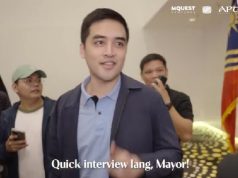Film Development Council of the Philippines chair Liza Diño-Seguerra wrote a lengthy post on Facebook addressed to colleagues in the film industry who have dragged the FDCP’s own Pista ng Pelikulang Pilipino film festival into the brewing controversy involving the Metro Manila Film Festival.
“Pista ng Pelikulang Pilipino was born out of an executive order proposal we submitted to the Office of the President to create a National Film Month—yes, a month-long celebration of PHILIPPINE CINEMA. In [observance] of Buwan ng Wika, we wanted to encourage our country to use cinema as a medium to celebrate our culture, our stories and everything that makes us Filipino,” Diño began her post.
“PPP is a pilot project supporting this proposal—a nationwide week-long celebration timed exactly during Linggo ng Wika, where Filipino films will have an exclusive platform to be screened in ALL CINEMAS nationwide. It almost seemed impossible to get everyone’s support in this but we found ways—we partnered with theaters and government agencies uniting in the commonality that we are here together as stakeholders to promote good quality films. The intention is PURE—-to give ANOTHER exclusive platform to our local audience [with no competing] foreign films.”
What the PPP is not are things Diño says its critics (whom she did not name) from the film industry are calling it.
“PPP IS NOT AN ALL INDIE FILM FESTIVAL—IT IS OPEN TO ALL. It aims to blur out the lines—Walang indie vs mainstream dito. Just well-made films. We have entries from major film studios like Viva and Star Cinema as well as films from independent productions like Idea First, T-Rex Films, TBA studios, CinemaOne, ToFarm, Unitel, Michelena Brothers and Tropic Frills Inc. Half of the films are doing a world premiere and half have won in respective local and international film festivals and deserves to be seen in a nationwide platform.”
Diño also stressed that the PPP is not designed to compete with the MMFF and separate indie from mainstream films. It is also neither a direct response to Senator Tito Sotto’s resolution that he filed early this year for the creation of an independent film festival separate from the MMFF.
“PPP has nothing to do with MMFF. Not even with the proposal of Sen. Tito Sotto. We submitted this proposal way before he put his in public,” Diño declared.
“Actually, if this [the PPP] becomes successful, the bigger vision is to have these platforms three times a year—April, August [and] December. I haven’t discussed this with partners but I believe that our stakeholders are open to try anything that would help our local cinema.”
Just the same, Diño could not help but express her dismay towards those who are questioning the FDCP’s intentions in creating the PPP “in the guise of protecting independent cinema.”
“Imbis na makita ang kagandahan ng mas maraming plataporma para sa ating mga sariling pelikula, sinasabing kinakalaban ang MMFF at lalong hinihiwalay ang indie sa mainstream. Worse, it’s coming from people na galing mismo sa industriya natin. (Instead of seeing the good things about having several platforms for our movies, they are saying that the PPP is competing with the MMFF and further separating the indie from the mainstream. Worse, it’s coming from people from our own industry.”)
The FDCP has actually been staging its own film festivals in recent years. In 2013, it staged the Sineng Pambansa All-Masters National Film Festival which was marred by several glitches including the very late screenings from some of the participating master filmmakers.
From 2014 to 2016, the FDCP then staged the World Premieres Film Festival which while moderately successful was eventually scrapped due to its ambitious but rather impractical name as many foreign filmmakers would prefer to have their films’ world premiere in the bigger and more prestigious festivals in Cannes, Venice and Berlin.
In staging the Pista ng Pelikulang Pilipino, Diño is of the view that instead of staging an expensive international film festival, the FDCP’s resources will be put to better use for a festival dedicated to quality Filipino films and at least for the festival’s duration, level the playing field against Hollywood movies.
“Marami sa pelikula natin ngayon ang hindi kumikita pag nahahalo sa malalaking hollywood films. Karamahihan, lalo kung galing sa indpendent production, natatabunan especially pag hindi namamarket ng maayos ang pelikula. Nalulunod sila against these hollywood films during regular playdates. FDCP hopes to resolve that issue by clustering our films together para ma-encourage ang audience na manood.”
(“Many of our films are not making money when pitted against big Hollywood productions. Many films, especially independent productions don’t stand a chance against these Hollywood films on regular playdates especially when not properly marketed. FDCP hopes to resolve that issue by clustering our films together to encourage our audiences to watch.”)
“We have an amazing line up of films that could offer what we could only dream MMFF would consider, and yet some of you will CHOOSE to not support PPP dahil para sa inyo, supporting this project means we are letting MMFF go to the ‘giants.’ (because for you, supporting PPP means we are conceding the MMFF to the ‘giants’.) Now sino sa atin ang sumuko? Imbis na suportahan lalo ang PPP para patunayang MAY AUDIENCE ang maindies and alternative mainstream films, gusto nyong magfail para mawala ang project?”
(“Who between us is giving up? Instead of supporting PPP to prove that maindies and alternative mainstream films have an audience, you want it to fail so it will eventually be discontinued?”)
Diño is a member of the MMFF Execom who has opted to stay following the resignations of members Ricky Lee, Kara Magsanoc-Alikpala, Rolando Tolentino and, most recently, Ed Lejano.
But even with her presence, Diño concedes that “MMFF is MMDA’s and it has its own thrust.”
“Whether that is followed or not is really beyond my control but it doesn’t mean I will stop pushing. Now PPP—this is OURS. Tayo ang magpapalakad nito. (We are the ones running this) It is an FDCP project and we engaged the help of ALL STAKEHOLDERS—from exhibitors, to producers, government agencies, to work together and celebrate PHILIPPINE CINEMA.”
“Yes, I am shamelessly asking for the whole country’s support in this. We are not earning here…We are doing this because we believe in the project and the success of this nationwide platform can be a game changer for Philippine Cinema. It will prove that there really is an audience for quality genre films. The Filipino audience deserves this. But we need your help and support, too,” Diño concluded.










